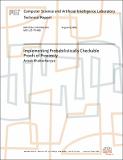Implementing Probabilistically Checkable Proofs of Proximity
Author(s)
Bhattacharyya, Arnab
DownloadMIT-CSAIL-TR-2005-051.ps (12969Kb)
Additional downloads
Other Contributors
Complexity Theory
Metadata
Show full item recordAbstract
Abstract: In this paper, we describe a proof-of-concept implementation of the probabilistically checkable proof of proximity (PCPP) system described by Ben-Sasson and Sudan in \\cite{bs05}. In particular, we implement a PCPP prover and verifier for Reed-Solomon codes; the prover converts an evaluation of a polynomial on a linear set into a valid PCPP, while the verifier queries the evaluation and the PCPP to check that the evaluation is close to a Reed-Solomon codeword. We prove tight bounds on the various parameters associated with the prover and verifier and describe some interesting programmatic issues that arise during their implementation.
Date issued
2005-08-08Other identifiers
MIT-CSAIL-TR-2005-051
MIT-LCS-TR-998
Series/Report no.
Massachusetts Institute of Technology Computer Science and Artificial Intelligence Laboratory